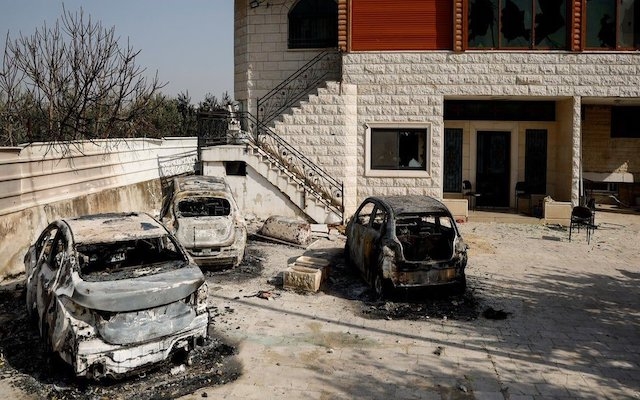The Palestinians have turned the city of Huwara into a pilgrimage site as part of the propaganda war against Israel. Following the shameful riot that saw the burning of cars and buildings after Palestinian militants murdered two brothers in the city, the Palestinian city has in recent days become a magnet for public figures who were quick to condemn the "crimes of the settlers and the occupation" without any criticism of Palestinian attacks against Israeli civilians that have killed 14 Israelis in the past few months.
The mayor, under the orders of the Palestinian Authority, left the burned car skeletons in the area as a display so that the many visitors could be impressed by "the brutality of the settlers and the State of Israel." The murderous shooting attack by the Yaniv brothers, and their murderers who have not yet been caught, are not mentioned, of course, as the beginning of the unfortunate chain of events.
And probably will stay like this, since this atmosphere and scenery is daily life for Huwara's residents (just now there is news of settlers gathering again in Huwara)
— Ido Fuchs (@FuchsIdoPal) March 6, 2023
Last week, the US special envoy for Palestinian affairs, Hadi Amar, visited Huwara and demanded that those responsible for the arson be brought to justice. Representatives of the European Union also visited Huwara last week and saw the remains of the burned cars. On Sunday, members of the monitoring committee of the Israeli Arabs visited Huwara Among them Knesset Member (MK) Ahmed Tibi, who compared the event to Kristallnacht in Nazi Germany. The words of MK Zvika Fogel and Minister Bezalel Smotrich regarding Huwara after the murder, Tibi defined as statements of neo-Nazism.
In addition, MK Tibi referred to the relationship between the Israeli Arabs and the citizens of the Palestinian Authority, "We are one people, and we are not here to show solidarity, but to integrate into our people," said Tibi, and added, "the Israeli government includes members and ministers who feed and encourage Jewish terrorists."
Remember this Israel.
— Stone W (@StoneWaimea) March 5, 2023
400,000 Israelis standing up for the rights of PALESTINIANS in Huwara, an Arab town where 2 JEWISH boys were shot to death in their car.
NOT ONE Palestinian group has stood up for FOURTEEN Jews murdered in one month. NOT ONE Palestinian group CONDEMNED. https://t.co/1HjHYmMbFN pic.twitter.com/dnu7qR1G4q
He called on the international community not to be content with expressing concern, but to take practical steps against Smotrich, Ben Gvir, and the IDF, who, according to him, turned a blind eye to the settlers' attacks even though they knew what they were planning. The monitoring committee's delegation also included national and religious public figures from the West of Israel as well as other Arab members of the Knesset, who walked among the skeletons of the burned cars and houses and expressed a willingness to "provide all possible forms of support."
Invoking the false analogy of “pogroms”, be it out of malice or mere ignorance, hijacks Jews’ historical traumas to inflame an incendiary situation, writes @Gil_Troy https://t.co/Pf6FEyYZbU
— Wall Street Journal Opinion (@WSJopinion) March 3, 2023
Among the critics was the head of the northern faction of the Islamic movement, Raad Salah, who stated that "the occupier can destroy or burn a house and cut down a tree, but he cannot destroy the Palestinian truth, and our people will remain stable in their country until we win."


